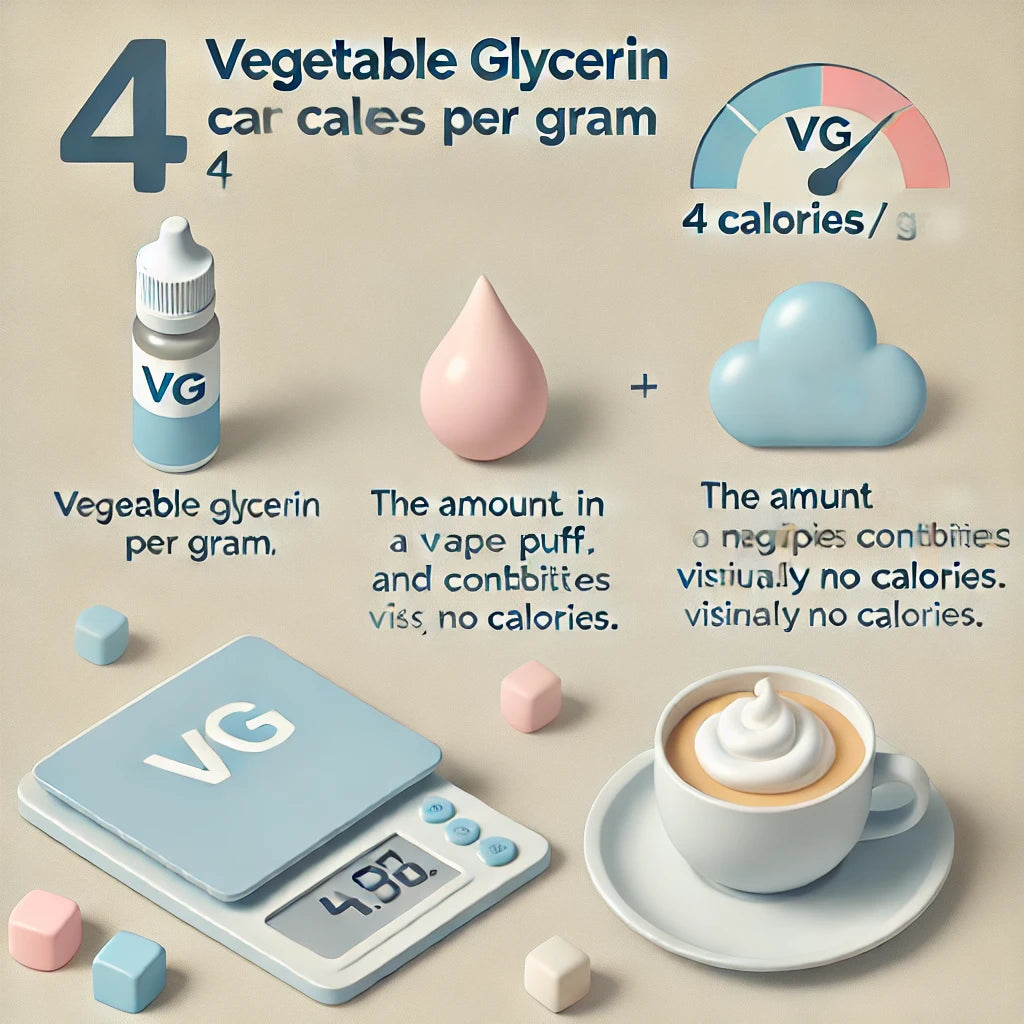How Many Calories Per Vape Puff? Exploring the Truth Behind Vaping and Calories

Are you curious about how many calories you're consuming with every puff of your vape? Vaping has become a popular alternative to smoking, but what about its impact on your diet? In this blog, we’ll break down how vaping affects your calorie intake, explore the components of e-liquids, and review popular brands making waves in the vaping industry. Plus, we’ll discuss real customer experiences to give you a complete picture.
What Makes Up a Vape?
Before we dive into how many calories you’re consuming, let’s first understand what goes into your vape:
- Vegetable Glycerin (VG): VG is a thick, sweet liquid that helps produce vapor. It has about 4 calories per gram, but the amount vaporized per puff is minuscule.
- Propylene Glycol (PG): A thinner liquid that carries nicotine and flavor. PG has virtually no calories.
- Flavorings: These are food-grade ingredients that give vape juices their taste. They’re used in small quantities, contributing negligible calories.
- Nicotine: Nicotine, the addictive substance in e-cigarettes, contains zero calories.
How Many Calories Are in a Vape Puff?

Now, let’s answer the burning question: how many calories per vape puff? The short answer is almost none. Here’s why:
- VG and PG: VG has about 4 calories per gram, but only a tiny fraction of the liquid is vaporized with each puff, so it results in almost no caloric intake.
- Nicotine: Nicotine does not contain any calories, so it won’t add anything to your calorie count.
- Flavoring: Flavor agents in e-liquids are present in trace amounts, so they contribute negligibly to the overall calorie content.
In short, vaping contributes virtually no calories per puff.
Customer Experiences: What Are Vapers Saying?
While vaping doesn’t add calories, many vapers are still curious about its effects. Here are some insights shared by users from various vaping forums:
-
Sarah, Puff Bar User: “I’ve worried about the health effects of vaping, but calories weren’t an issue. After doing some research, I found that there’s no real calorie impact.”
-
John, Long-Time Vaper: “I was concerned vaping might affect my weight, but I haven’t noticed any real changes. The idea of it adding calories was more of a worry early on.”
-
Emily, Health-Conscious Vaper: “I started vaping with some concerns about weight loss, but after discovering it doesn’t contribute any calories, I felt more confident continuing.”
Vaping and Metabolism: Can It Affect Your Weight?

While vaping doesn’t significantly affect calorie intake, some studies suggest that nicotine can have minor effects on metabolism:
-
Appetite Suppression: Nicotine is known to suppress appetite in some people, which may lead to a slight reduction in food intake. However, the impact is minimal and not a reliable method for weight loss.
-
Increased Metabolic Rate: Nicotine has been shown to slightly boost metabolism, but the increase is minimal and not a substitute for proper weight management practices like exercise and a balanced diet.
-
Psychological Effects: For some, vaping may replace unhealthy habits such as snacking, but this is not a guaranteed method for weight management.
Popular Vaping Brands and Their Products
Although vaping won’t affect your calorie intake, it’s essential to know which brands are leading the market. Below are a few popular options:
-
Puff Bar
- Flavors: Known for a wide range of flavors like Blue Razz, Strawberry Banana, and Blueberry Lemonade.
- Nicotine Strength: Offers 5% nicotine salt for a strong yet smooth hit.
-
Convenience: Disposable, so no refilling or maintenance is required.

-
Juul
- Flavors: Popular flavors include Mint, Mango, and Fruit.
- Nicotine Strength: Uses 5% nicotine salt in pods for a smooth experience.
-
Design: Compact and portable, perfect for discreet use.

-
Vuse Alto
- Flavors: Includes Menthol, Golden Tobacco, and Fruity options.
- Nicotine Strength: 5% nicotine for a satisfying experience.
-
Design: Sleek and ergonomic, ideal for an on-the-go vaping experience.

-
SMOK Nord 4 (Pod System)
- Flavors: Refillable pods that you can use with your favorite e-liquid.
- Nicotine Strength: Adjustable nicotine levels from 3mg to 50mg.
- Versatility: Adjustable airflow and wattage for a customized experience.
Pros and Cons of Vaping and Calorie Intake
Pros:
- Negligible Calorie Intake: Vaping adds virtually no calories to your diet.
- Convenient: Disposable vapes like Puff Bar are easy to use with no maintenance.
- Variety: Wide range of flavors available to suit all preferences.
Cons:
- Health Risks: Vaping carries risks, including addiction and respiratory issues.
- Nicotine Dependency: Nicotine can lead to dependency if used long-term.
Conclusion: Is Vaping a Viable Option for Weight Management?
Vaping does not significantly contribute to your calorie intake. However, it is not a viable solution for weight loss. The health risks associated with nicotine use far outweigh any minor effects on metabolism.
For effective weight management, focus on a balanced diet and regular exercise. But if you enjoy vaping, you can rest assured that it won’t add calories to your daily intake. Just remember to choose reputable products and be mindful of the long-term health consequences of nicotine use.
